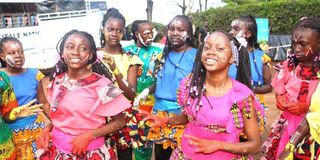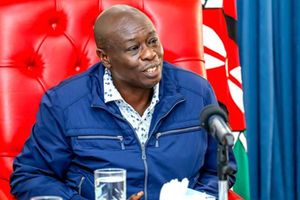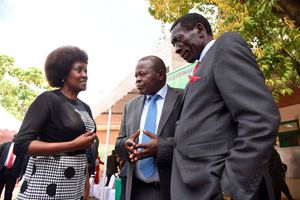
Migosi Primary School pupils with their winning creative cultural dance of the 62nd edition of the Kenya National and Drama and Film Festival at Kangaru Girls High School on 17 April 17, 2024.
When Mukuuni Boys High School from Tharaka-Nithi County was pronounced the winner of the 2024 National Schools and Colleges Drama Festivals (play category) it took many drama enthusiasts by surprise. The school won the coveted prize at its first appearance at the national stage, upsetting the order of the annual event that has recently been dominated by a few schools and creative directors.

Wajir High School students celebrate after being awarded the Best Choral Verse on sponsored by Kenya Revenue Authority during the 62nd edition of the Kenya National Drama and Film Festival at The University of Embu on April 14, 2024.
The announcement has since drawn mixed reactions, with some observers opining that some more spectacular productions deserved to win. However, the adjudicators’ decision emphasises a major point as pointed out by one of them, Simon Peter Otieno; a good storyline and good acting.
“It was so simple to follow and the actors were so natural,” said Dr Otieno.
The finals took place at Kangaru School and the University of Embu from April 8 to 14 2024 and the gala performances taking place on Monday and Tuesday. The State concert will be held at the Sagana State Lodge on Thursday.

Kangaru Girls High School during the 62nd edition of the Kenya National Drama and Film Festival at Kangaru Girls.
“I applaud the play written on banditry and tribal issues. The winning pieces worked within our expected spectacle. They were very simple and entertaining. It was so good on talent and simple to follow. Each action had a word. It wasn’t dialogue alone,” Evelyne Pwokah, another adjudicator said.
The first runner-up play, The Prescription, by Friends School Kamusinga was equally strong on scripting, acting and direction with a creative yet simple set. It revolves around Stefano, a high school student who struggles to cope with his tyrannical father’s expectations on academic performance.
According to many theatre buffs and school administrators, the drama festival has, for some time, been taken over by commercialisation that locks out the majority of schools and learners from participating and created an elite club. Some schools invest heavily in the festival and use it as a marketing tool to attract more learners.
For instance, there were no day schools presenting a play at the festival despite the Ministry of Education data showing that about 75 per cent of learners in secondary attend day schools. The primary schools category was dominated by private schools, with only well-established public schools like Westlands Primary from Nairobi participating.
The cabinet secretary for Education Ezekiel Machogu said that more schools are expected to participate in the festival since it is part of the competency-based curriculum. He spoke while in Embu during the gala performance of the best items on Monday.
The chair of the festival Prof Christopher Odhiambo admitted that schools without resources are disadvantaged.

Westlands Primary School pupils celebrate after being awarded the best CBC Play Sponsored by KICD during the 62nd edition of the Kenya national drama and film festival at Kangaru Schools on April 14, 2024.
“We give equal opportunity to all the schools to participate but some schools are more abled than others and they can hire trainers who help them with their performances. However, we hold workshops and we don’t restrict the number of participating teacher trainers,” he told Nation.
The trainers he was referring to, commonly known as mercenaries, within drama circles do not come cheap and have pushed the stakes high. Some schools are sponsored by political leaders and one was had its bills footed by a county government. It dropped off at the Eastern region festivals.
In addition to the scriptwriters and trainers, schools spend a fortune on costumes and backdrops to produce spectacles on stage. The term is used to refer to the gadgetry and razzmatazz on stage that is intended to mesmerise the audience. In a break from the recent past, it is noteworthy that the top items these year did not have outlandish spectacles on stage.
Dr Emmanuel Shikuku, a lecturer of theatre and film at Kenyatta University and a veteran of the festival told Nation that he is against the use of the non-teacher trainer, saying it negates the spirit of education in general and CBC in particular.
“Teachers have abdicated their role. We wouldn’t have this cut-throat competition if it was teacher-oriented. The consultants want to impress the principals who’re their employers. This draws us from the co-function of drama as a cocurricular activity. Drama shouldn’t just be for entertainment but a co-learning activity. You can’t handle children if you don’t know the psychology of children,” he said.
He revealed that some of the ‘mercenaries’ charge as much as one million shillings. They are paid half of the amount to take a team for region festival, more for participation and another portion for the national finals and more if they win. Dr Shikuku decried the lack of diversity in the items staged.
“It’s not good to see the same thing year-in, year-out. Politicians are now influencing drama and although it’s subtle, their presence and participation at the festivals is influencing things,” Dr Shikuku said.
A teacher from Embu County confirmed that only a few schools can afford to pay the trainers.
“These ‘mercenaries’ charge as high as Sh200,000 per script and more for directing drama items. They have no loyalty and at times you can have the top items by the same person competing against each other, something that wouldn’t happen if it was left in the hands of teachers,” a teacher told Nation.
She went on to complain that drama patrons from such schools are at times promoted based on results that they never worked for.

Kisumu Girls High School students celebrate after being awarded the best CBC item in their Creative Cultural Dance during the 62nd edition of the Kenya National Drama and Film Festival at The University of Embu on April 14, 2024.
“They are awarded certificates for scripting and directing yet they can’t write anything creative. This is cheating. What’s sad is that is that some of the ‘mercenaries’ are poor young men and women who are only profitable engaged in first term and unemployed for the rest of the year,” she said.
A senior official at the Ministry of Education expressed reservations about allowing non-teaching close interaction with learners as they are not answerable to either the Teachers Service Commission or the ministry.
“I was concerned when I saw some of them hugging the girls after a performance, something a professional teacher would never do. There must be limits to what can be done and what can’t,” he told Nation.
The cost of participating at the festivals was confirmed by the principal of Mukuuni Boys Dickson Kabara who told Nation that the school has spent about Sh700,000 to get the winning play to the national stage.
“And we’re still spending while here but it’s good for the school. We’re also expecting good results in the national examinations. This is a huge morale booster and we’ve proven to our students that we can conquer even national schools,” he told Nation. Mukuuni is an extra-county school.
The play, Player Number 10, revolves around Jabulani, a young from the Community of the Sun that is ravaged by banditry. He’s a gifted footballer who hopes to play internationally but not before changing the harmful culture of his community. He uses football to lure youth from the fighting fields and onto the football pitch.
It was written by Warren Ligare and Nicholas Ngeri. They directed it alongside Edwin Ochieng and Carlos Oyoma and the drama patrons at the school Jane Ndung’u and Peter Nyamu. The play almost never made it to the regional festival after it was placed second during the county competition.
“Only the number one play was to proceed to regionals due to financial constraints, so the school offered to pay in order to participate and we were allowed. They went and performed on the first day and went back to school unlike others who stayed there for a whole week. At the nationals again, we were on stage on the first day, something schools dislike but here we are as champions,” Mr Kabara said.

Moi Girls Nairobi students display the trophy they won for their choral verse at Kangaru Girls High School on April 17, 2024.
Over the years, more creative items have also been included in the festival. For years, the main items were the play, solo and choral verse and the dramatised cultural dance. Others were gradually introduced like the narrative, stand-up comedy and modern dance with latest being the solo dance and mime. Learners with special needs are also represented at the festival, with a special category created for them.
“For schools with limited resources, it’s impossible to participate in the film categories. Only the well-endowed schools compete in these ones. Funding of drama activities needs to revert back to the principals and not retain the funds at the ministry,” a principal told Nation.
While the festival was previously a high school affair, it now incorporates all segments of the education sector from early childhood development education to tertiary institutions.
Another complaint has been about the influence of corporate sponsors at the festivals. The corporate donate money and also several awards and trophies for items that are produced that capture their mandate. This year’s main title sponsor is the Kenya Institute of Curriculum Development (KICD).
“We’ve managed to use the festival to push messages, especially around the CBC. From the items presented, it’s clear that CBC is no longer a mystery among teachers and learners,” said the chief executive officer of KICD Charles Ong’ondo.
Other main sponsors this year were the Kenya Revenue Authority, Communications Authority of Kenya, Independent Electoral and Boundaries Commission, the Kenya Cultural Centre, Brooke East Africa, the Kenya Universities and Colleges Central Placement Service and the Sports, Arts and Social Development Fund.

Matuga Girls School from Coast region presents a creative cultural dance during the Kenya National Drama Festival at the University of Embu on April 14, 2024.
“It’s become too common to see the same themes running through as directors try to catch the sponsor’s eye. It’s not good for creativity which is supposed to flow freely,” said Evans Kimani, a teacher and director.
His sentiments appeared to have been validated by the adjudicators. The top items did not over-emphasise themes advanced by the sponsors. The theme for the 2024 festival is Unlocking opportunities for socio-economic transformation through drama and film.










